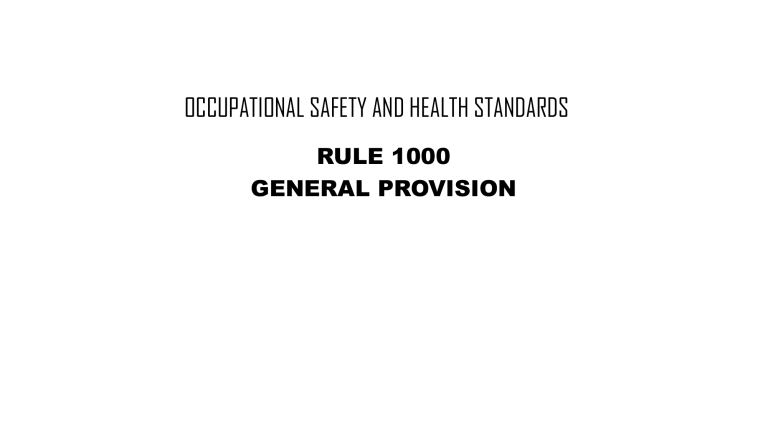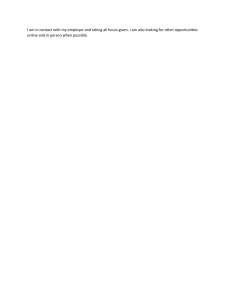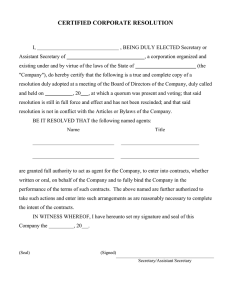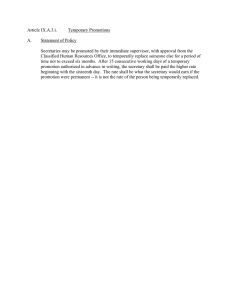
OCCUPATIONAL SAFETY AND HEALTH STANDARDS RULE 1000 GENERAL PROVISION 1001: Purpose and Scope The objective of this issuance is to protect every workingman against the dangers of injury, sickness or death through safe and healthful working conditions, thereby assuring the conservation of valuable manpower resources and the prevention of loss or damage to lives and properties, consistent with national development goals and with the state’s commitment for the total development of every worker as a complete human being. This Standards shall apply to all places of employment except as otherwise provided in this Standard. 1002: Definitions For purposes of this Standards and except as otherwise indicated, the following shall mean: 1. “Employer” includes any person acting directly or indirectly in the interest of an employer, in relation to an employee, and shall include government-owned or controlled corporations and institutions, as well as non-profit private institutions or organizations. 2. “Employee” shall mean any person hired, permitted or suffered to work by an employer. 3. “Industrial Enterprise” shall mean any workplace, permanent or temporary, including any building or collection of buildings, shed, structure, yard or any other place, where permanently or temporarily one or more persons are employed in any manufacturing of goods or products processing and any other activity similar and incidental thereto. 4. “Agricultural Enterprise” shall include forestry and logging operations, farming in all its branches, and among other things, includes cultivation and tillage of the soil, dairying, the production, cultivation, growing and harvesting of any agricultural and horticultural commodities, the raising of livestock and poultry, and any practice performed by a farmer on a farm as an incident to or in conjunction with such farming operations, but does not include the manufacturing or processing of sugar, coconut, abaca , tobacco, pineapple or other farm products. 5. “Dry Dock” shall include premises where work is performed on shore or on board ships in which ships or vessels are constructed, repaired, refitted, finished or broken up and housed. 6. “Health” shall connote a sound state of the body and mind of the worker, which enables him to perform his job normally, in a state of well-being. 7. “Safe or Safety” shall refer to the physical or environmental conditions of work or employment, which substantially comply with the provisions of this Standards. 8. “Work Accident” shall mean an unplanned or unexpected occurrence that may or may not result in personal injury, property damage, work stoppage or interference or any combination thereof, which arises out of and in the course of employment. 9. “Work Injury” shall mean any injury or occupational illness suffered by a person, which arises out of or in the course of his employment. 10.”Occupational Illness” shall mean any illness caused by environmental factors, the exposure to which is characterized or peculiar to a particular process, trade or occupation and to which an employee or worker is not ordinarily subjected to or exposed outside of or away from such employment. 11. ”Recognized Hazards” are those which do not require technical or testing devices to detect. 12. ”Workplace” means the office, premises or work site, where the workers are habitually employed and shall include the office or place where the workers, who have no fixed or definite work site, regularly report for assignment in the course of their employment. 13. ”Approved” shall mean acceptable to the Secretary in writing after proper examination showing compliance with prescribed Standards. 14. “Code” shall mean the Labor Code P.D. 442 as amended. 15. “Department” shall mean the Department of Labor and Employment. 16. “Secretary” shall mean the Secretary of Labor and Employment. 17. “Bureau” shall mean the Bureau of Working Conditions. 18.”Director” shall mean the Director of the Bureau of Working Conditions. 19.”Standards” shall mean the Occupational Safety and Health Standards. 20. ”Enforcement officer” shall mean the industrial safety engineer, the labor regulation officer, or any duly authorized representatives of the Secretary to enforce this Standards. 21.”Authorized Representative” shall mean and include chartered cities, municipalities, employees or officials of other government agencies empowered by the Secretary of Labor and Employment to enforce the provisions of this Standards. 1003: Administration and Enforcement • 1003.01: Department of Labor and Employment 1. The Department of Labor and Employment shall administer and enforce the provisions of this Standards. 2. Every employer shall give to the Secretary or his duly authorized representative access to its premises and records for the purpose of determining compliance with the provisions of this Standards. 3. Every establishment or place of employment shall be inspected at least once a year to determine compliance with the provisions of this Standards. Special inspection visits, however, may be authorized by the Regional Labor Office or as authorized under Rule 1980 of this standards, to investigate accidents, occupational illnesses or dangerous occurrences, especially those resulting in permanent total disability or death, to conduct surveys of working conditions requested by the Bureau for the purpose of evaluating and assessing environmental contaminants and physical conditions or to conduct investigations, inspections or follow-up inspections upon request of an employer, worker or a labor union of the establishment. 4. The enforcement officer shall determine reasonable periods of compliance with recommendations depending on the gravity of the hazards needing corrections or the period needed to come into compliance with the order. • 1003.02: Application to Other Places of Employment When a condition of employment in workplaces not specifically covered by this Standards is the subject of complaints, the provision of this Standards shall apply. • 1003.03: Application to Transportation Establishments engaged in land, sea and air transportation are not covered except their garages, dry docks, port hangars, maintenance and repair shops. • 1003.04: Application to Mines The activities of a lessee regarding safety of mining installations, surface or underground, within the mining claim or lease, including mine safety, mineral conservation and problem of pollution in establishments or workplaces falling under “Mining Industry” as classified by the National Economic and Development Authority are not covered by this Standards. • 1003.05 : Application to Chartered Cities and Municipalities The Department of Labor and Employment shall be solely responsible for the administration and enforcement of this Standards in all places of employment except as provided in Rule 1980 of this Standards. 1004 : Special Inspection, Investigation and Review 1. Any worker or representative of workers or any concerned person who believes that a violation of any provision of this Standards threatens physical harm or imposes imminent danger to life, may request an inspection by giving full particulars or details regarding such violation or danger to the Regional Labor Office or duly authorized representative. If upon appraisal of such notification, the Regional Office or its duly authorized representative finds reasonable ground to believe that a violation has really been committed or danger exists, a special inspection or investigation shall be conducted immediately. The complainant shall be notified in writing of the outcome of such investigation or inspection, immediately upon its completion. 2. The Secretary of Labor and Employment on his own initiative or on complaints of the workers, shall review any failure or refusal of the Regional Labor Office or duly authorized representative to order compliance or issue recommendation with respect to such complaint or reported violation. 1005: Duties of Employers, Workers and other Persons 1. Each employer covered by the provisions of this Standards shall: • a. furnish his workers a place of employment free from hazardous conditions that are causing or are likely to cause death, illness or physical harm to his workers; • b. give complete job safety instructions to all his workers, especially to those entering the job for the first time, including those relating to the familiarization with their work environment, hazards to which the workers are exposed to and steps taken in case of emergency; • c. comply with the requirements of this Standards; and • d. use only approved devices and equipment in his workplace. 2. Every worker shall cooperate with the employer in carrying out the provisions of this standards. He shall report to his supervisor any work hazard that may be discovered in his workplace. 3. Every worker shall make proper use of all safeguards and safety devices furnished in accordance with the provisions of this Standards for his protection and that of others, and shall follow all instructions given by the employer in compliance with the provisions of this Standards. 4. It shall be the duty of any person, including any builder or contractor or enforcement agent, who visits, builds, renovates, or installs devices, or conducts business in any establishment or workplace, to comply with the provisions of this Standards and all regulations of the employer issued there under as well as with other subsequent issuances of the Secretary. 1006: Confidentiality of Trade Secrets All information reported to or otherwise obtained by the enforcement officer in connection with any inspection or proceedings under this Standards, which contains or might reveal a trade secret, shall be considered confidential except that such information may be revealed in any proceeding where it is required or necessary. The Secretary, the Regional Director or duly authorized representative, shall issue appropriate orders to protect the confidentiality of trade secrets.



